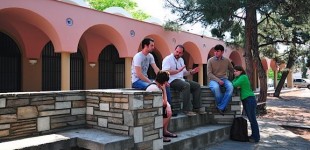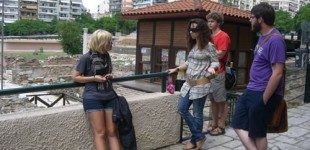I have asked the group’s members to write what they find exciting about coming to Greece and I also feel like writing what it is that I find exciting about this trip of which I have been the local coordinator twice already and tried to help students experience the Greek way!
Russell in his post said that my question is a reference to the future, and I suppose it is; but it so happens that references to the future cannot be evoked without some reference to a past, both of which are imagined because of my present interests.
I can’t help but think of the good times I had with the first group of students that visited Greece  three years ago: Chris, Jaci, Keke, Sean, and not to forget of course Professor Willi Braun’s contribution to that first trip! and a year later: Chris, John and Madison. Lots of good memories I have and lots of questions about the places we were visiting and the things we were seeing and tasting.
three years ago: Chris, Jaci, Keke, Sean, and not to forget of course Professor Willi Braun’s contribution to that first trip! and a year later: Chris, John and Madison. Lots of good memories I have and lots of questions about the places we were visiting and the things we were seeing and tasting.  Questions that made me see things all over again (which reminds me of Sophocles tragedy “Oedipus Rex” when Teiresias answers to Oedipus’s insults over his blindness “you have your eyesight, and you do not see” ); things that I was taking for granted; things that in my day-to-day living in Thessaloniki have become so ordinary that I wasn’t even paying attention to them anymore (taking the boat, for example, that makes a few rounds in front of Thessaloniki’s seashore or having Greek [ok Turkish] coffee or eating souvlaki or going to Mount Olympus or visiting a church, etc., etc., etc…. ).
Questions that made me see things all over again (which reminds me of Sophocles tragedy “Oedipus Rex” when Teiresias answers to Oedipus’s insults over his blindness “you have your eyesight, and you do not see” ); things that I was taking for granted; things that in my day-to-day living in Thessaloniki have become so ordinary that I wasn’t even paying attention to them anymore (taking the boat, for example, that makes a few rounds in front of Thessaloniki’s seashore or having Greek [ok Turkish] coffee or eating souvlaki or going to Mount Olympus or visiting a church, etc., etc., etc…. ).

I owe to the curiosity of these students my ability to see the ordinary as extraordinary because with their questions they were able, as Pierre Bourdieu said, “to evoke ordinariness in such a way that people (I) will see just how extra-ordinary it is.” Thus, having “outsiders” with the eagerness to learn and explore something new makes the “insider” actually to see his (and her!) own world all over again…! But, hmmm…, is the “insider” inside of anything anymore?
So what is exciting about the trip? I’m looking forward to discovering this once the co-directors of the program (Russell and Merinda) and the students (Alyssa, Andie, Emma, Susanna) are here to point to things I’m unable to see now!
Sometimes I wonder who is doing the experiencing and what they’re experiencing…But it is exciting anyways….
 I suppose when you are asked to
I suppose when you are asked to 
 ing Greek is many things but let us start from the beginning: it means that your ancestors (I won’t go as far as to say my great -great grandparents) were
ing Greek is many things but let us start from the beginning: it means that your ancestors (I won’t go as far as to say my great -great grandparents) were